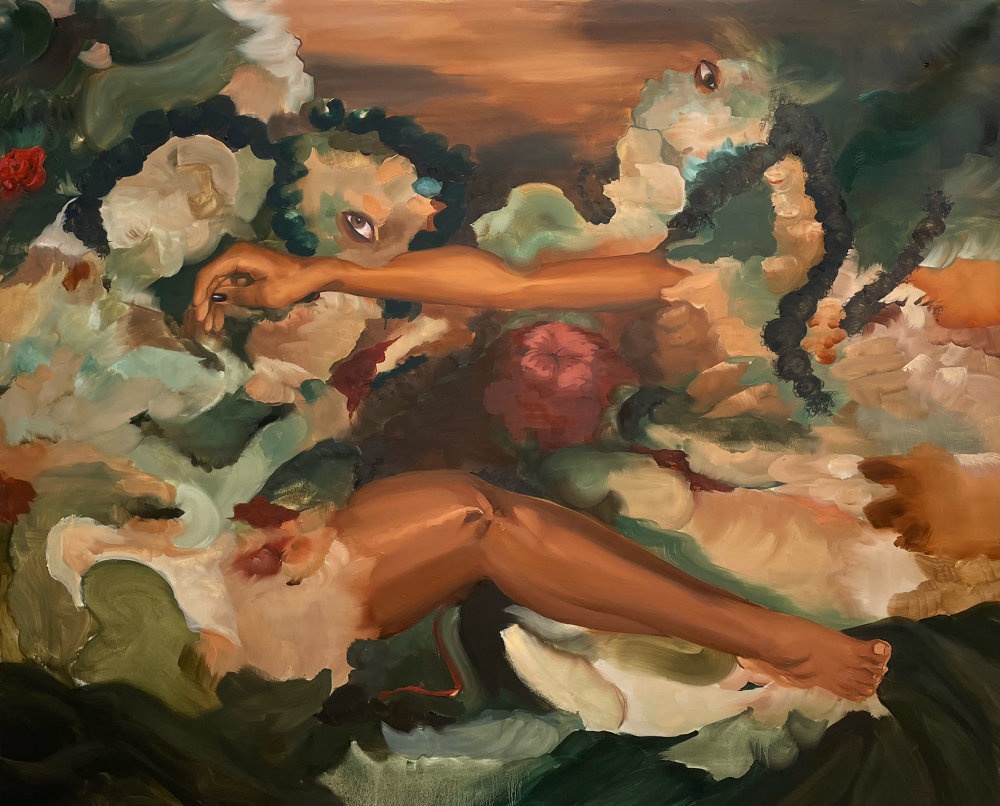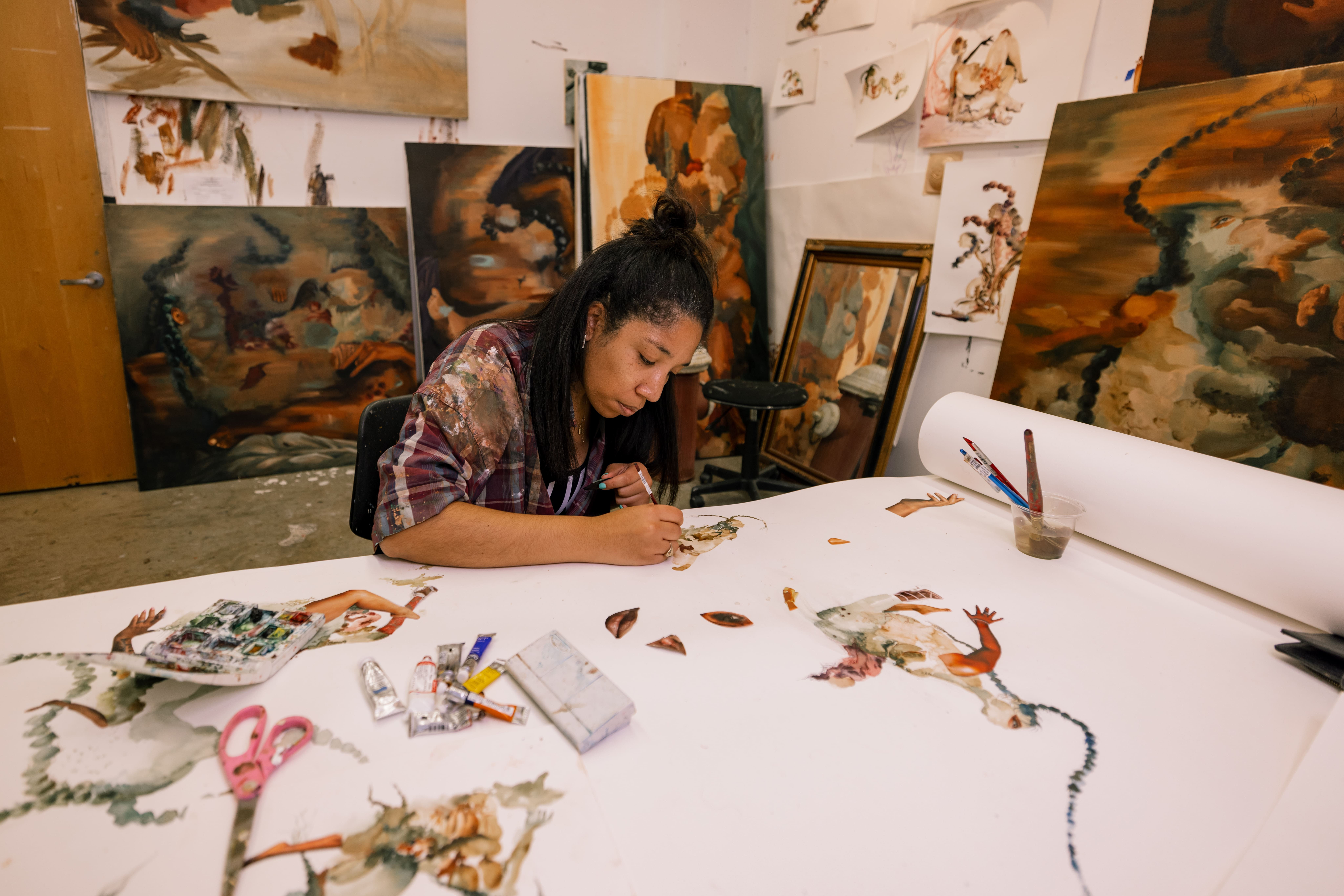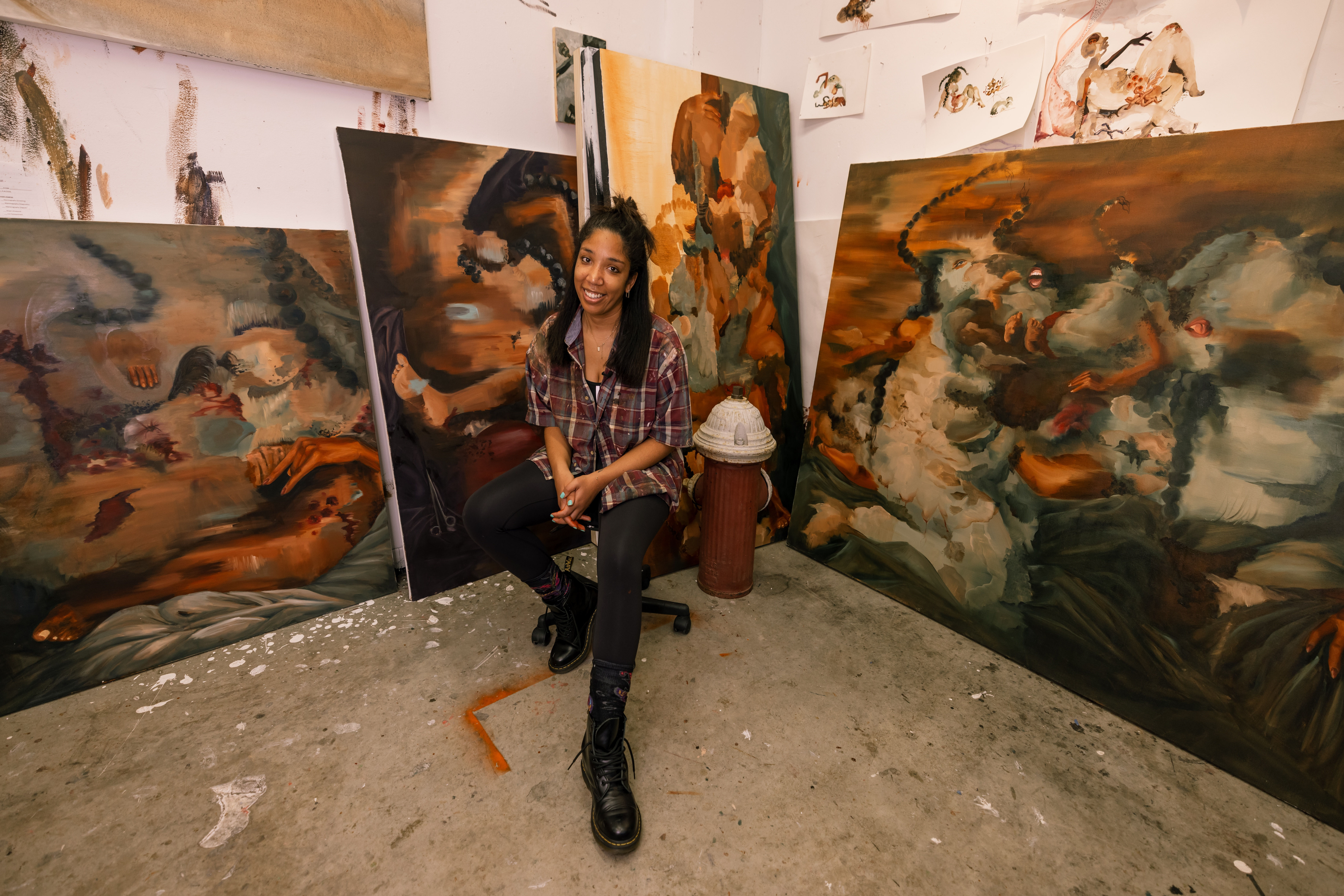
© Debra Cartwright. Image: Elizabeth von Stubendorff, 2023
Both of your parents have a scientific background, you, on the contrary, have chosen a creative field. Do you remember how and when you understood that you would like to become an artist one day?
I have honestly painted and drawn my entire life, however I never really knew how to make it into a career. I never knew anyone who called themselves an "artist" while I was growing up. I went to undergrad, majored in Art and American History, with the intention to go straight to law school afterward. Later I became art director of a magazine and afterward a good friend of mine suggested I apply to Parsons to be a graphic designer. After Parsons, I worked in magazines during my twenties and attended art shows ultimately, finally, meeting several people that practiced art as a career. It took ten years but ultimately, I decided I can do this too. That was five years ago and I’m still figuring it out.
One of the key topics that you are currently dealing with in your work, is quite tough – you investigate American medical history and its relationship with the Black female body. Was there any pivotal moment when you decided to go deep into this subject or how exactly did you get to it?
As mentioned, I’ve always been interested in American history. I find it fascinating to be a black American. Previously my work dealt with the black female body in rest, then I explored my own family history in the south, then that led me to Nat Turner’s rebellion, which was around the same area as my family ties. I try to keep my research loose and let myself fall into rabbit holes as they interest me. I don’t think it was a pivotal moment, just so many instances coming together to logically form a thesis. My mother is a gynecologist and recently retired, handing me her old surgical tools and vaginal diagrams, so that was floating around my studio as well.
 © Debra Cartwright, Forced To Hold each other down, 2022, Oil on canvas, 121.9 x 152.4 cm / 48 x 60 in.
© Debra Cartwright, Forced To Hold each other down, 2022, Oil on canvas, 121.9 x 152.4 cm / 48 x 60 in.How do you emotionally/mentally endure working with such a difficult subject? Do you manage to go home after working in the studio and “switch off”? Or do you think about it over and over again?
I absolutely love reading and I feel like as I read and write I prepare what I’m going to do in the studio. Obviously, I like to make room for mishaps and surprises but I feel most comfortable approaching work when it’s planned. No matter what I’m working on the content seems to come before the form so when I enter the studio I can almost block out content and focus on form. While oil painting, I play Beyonce and 80s funk to get myself out of my head, make my paintings more fluid and focus on the composition, light and color.
What other topics are you addressing with your artworks? What ideas and messages does your art communicate?
Over the past few years I’ve been thinking a lot about the American landscape. My undergraduate thesis was on Duncanson and the Hudson River School. I’ve always thought it was fascinating, this one black man, creating paintings with such controversial content. Manifest Destiny, the absolute ownership obsession of Americans, the sublime, have all influenced my work. I’m questioning what is a landscape, how is the body influenced by the history of this land, who is the subject? I want to evoke the eariness one feels after learning the history of a plot of American land. This country’s landscape is full of haunting stories affecting us today.
You have gone through a real transformation – starting from digital illustrations, created a The Hate U Give Book Cover, then turned to figurative paintings and in the end made a shift towards more abstract art. What made you try this entire new field? Do you feel that this is finally it, or is it only an interim stage?
I hope I’m never finished. What is art making if it isn’t growing? As I mentioned my degree is in art history and the work that blew me away started with Cezanne, the king of shifting perspectives. I hope I’m always challenging myself and the viewer.
I am very impressed by how many different forms and formats you have worked with: From a large-scale mural inside Twitter’s office to smaller scale work, like illustrations and book covers. Do you have any preference regarding scale? What is more challenging for you?
Well those murals were created digitally and done in vinyl, so I never really touched the scale. I felt very separated from that marketing material. I don’t have a preference for scale as much as I have a preference for materiality. I love the flow and feel of paint.
 © Debra Cartwright's Studio. Image: Elizabeth von Stubendorff, 2023
© Debra Cartwright's Studio. Image: Elizabeth von Stubendorff, 2023In one of your interviews, you said: “I have always been good at copying from life. Now, I’m stretching myself to paint from feelings.” Do you feel that now you are at the stage where you can paint from feelings?
Haha I say the darndest things. But yes, I think I am painting from feelings. As a black woman in America sometimes it feels like you’re screaming to just be heard at a whisper. I want to discuss the research I care so much about, from history to gynecology to painting itself and if my paintings are a gateway to the topics that interest me, I’m very happy.
Going deeper into your working process – do you use sketches or just approach the canvas and start painting from scratch?
I approach my practice through watercolor sketches with collages from magazines such as Essence. Watercolor has always been the most approachable medium for me and I use it every time I want a natural flow of thought. The magazine cutouts nod to the notion that contemporary black women are still affected by the stories of the past.
In your latest works you tend to use a dark, “earthy”, and even depressing color palette. That is obviously related to the topic within your work. However, would you like to experiment with a brighter color scheme?
I began oil painting following a very traditional Venetian approach. That included a lot of burnt sienna and ultramarine blue. These colors are not only the best for painting skin but they have become my homebase.
You have taken an impressive path from being a commercial illustrator and finding solutions for clients – to becoming an independent artist. Do you enjoy your freedom now or does it make you feel nervous sometimes?
Interesting question. I’ve definitely intentionally moved away from being a commercial illustrator in an effort to make work about the topics I care about. As I mentioned, it’s hard for a black woman’s voice to be heard, especially when discussing the flaws of America and uncovering the parts of its hidden histories. It certainly doesn’t make me nervous, more excited.
 © Debra Cartwright's Studio. Image: Elizabeth von Stubendorff, 2023
© Debra Cartwright's Studio. Image: Elizabeth von Stubendorff, 2023And now let’s throw a glance at the future. How do you see your practice developing? What projects and ideas would you like to bring into life one day?
I’d love to continue the work I’m doing for the next few years, hopefully in public artworks and museum shows. Programming is really important to me to ultimately spread awareness about the hard time black women are having with the American healthcare system. Black women are three to five times more likely to die in childcare than white women are 40% more likely to die from breast cancer than white women. The disparities in care need to be addressed and I’d like my work to do whatever it can to bring that discussion to the forefront.
Interview conducted by Valentina Plotnikova